My iPhone screams me awake, as it does every morning. Recently this incessant screeching has become less irritating, as I’ve grown more accustomed to the demands that clinical education makes on a third-year medical student. I begin my routine: shower, scrubs, microwaved breakfast sandwich, then out into the dark morning, actually looking forward to my day.
I’ve been on a roll in my new family-medicine rotation, enjoying my time with my supervising doctor and learning quickly under her tutelage. It feels as if it’s coming together—the pages upon pages of textbooks and notes replaced by real patients and newfound responsibilities.
Arriving at the clinic, I join the healthcare workers traipsing into the building—a procession I’d longed to join. Having made it through countless practice questions and tests in middle school, high school, college and preclinical med school, I finally feel a semblance of readiness.
I flip the light switch in the clinic office. Logging into the now-familiar EPIC electronic medical record, I click on the first patient on the list, Mrs. Lopez.
My roll stops.
I look at Mrs. Lopez’s problem list, see the multiple emergency-department encounters and see the labs, all telling a familiar story. With dread, I fumble my way to the Imaging tab, trying to prepare myself to see someone’s entire fate summarized in a radiologist’s note.
It’s just as expected, but heartbreaking nonetheless: stage IV, metastatic. The locations of metastasis—brain, lungs, liver, omentum, mesentery, ascending and descending colon, bone—leave little doubt as to the prognosis.
Mrs. Lopez is young—too young in my amateur opinion: only thirty-nine. As I continue my melancholy trudge through the chart, click by click, her story takes shape. Diagnosed at stage IV, she’s had innumerable surgeries and procedures, sixteen rounds of two-week sessions of chemo; she’s currently trying her fourth different formulation, using anti-nausea medications as fast as the physician can prescribe them. She’s a mother of three, married, Spanish-speaking.
I stop reading. My usual confidence is swamped by mounting anxiety and dread. I’ve seen hundreds of charts before, but now I feel I’m seeing information that is far too personal for my eyes. What is a doctor, much less a medical student, supposed to say or do in a case like this?
I switch on autopilot and walk out of the workroom and towards Mrs. Lopez’s room, suddenly feeling hot despite the ever-present air conditioning.
She is a small woman with a look of grim determination, holding a sloshing trashcan-turned-emesis-bucket between her legs as she sits on the maroon exam chair. Her thinning hair and sickly grey complexion are the very image of chemo.
Using my limited Spanish, I introduce myself and tell her that I will call the translator on the phone. We sit together in silence as I open that damn EMR again, with its story of death sitting right there on the screen.
As the interpreter translates some opening niceties, I meet Mrs. Lopez’s gaze—and she looks straight through me.
Can she tell so easily how undeserving I am of the conversation that’s about to unfold? I wonder.
After the interpreter gets her consent to proceed, I start with the usual question: “What brings you in today?”
We push through my well-worn script—chief complaint, history of present illness, review of systems—until we get to family history. Here I lead Mrs. Lopez in a twistedly cruel call and response:
“Mother?” “Father?” “Siblings?” “Grandparents?” I ask.
“Dead from cancer,” she responds again and again. Her father, mother, uncle, brother, grandfather and both grandmothers all succumbed to one form or another of cancer.
My words start to feel like audible poison. I stop, thinking, Why am I still doing this?
It is part of the history, is the answer. I’m doing what has been drilled into me for two years. But it occurs to me how exorbitantly cruel it is to put Mrs. Lopez through this line of questioning.
She notices that I’m stuck. Immediately, she softens and looks me in the eyes.
“I can see that you’re struggling,” she tells me through the interpreter. That is true: I’ve never been in this position before.
I sit there searching for something to say—partly knowing that asking “Are you still not smoking?” is totally inappropriate to the situation, and partly feeling awed by the intuition and compassion of this woman.
She beats me to the punch: Before I can open my mouth, she begins to share about her family and her experiences.
“It’s not just my family that’s affected, or my health; everything around me has shifted since my diagnosis. My job seems like a distant memory. And the future?”
She sighs.
“The hardest part of this is what it’s doing to those around me.”
I try to picture her husband and children, and what their life was like before her diagnosis. As she speaks, the picture finally comes fully into focus. Not only has the cancer spread all over her body, but it has interjected itself into the story of her life, like a drunk heckler at a comedy show. It affects every facet of her being.
She wants the final frame of her film to be one of resilience, and the thought of its being anything other than that scares her more than cancer ever did.
“I will continue, I will still get treatment, because I can’t just give up,” she says with increasing volume and conviction. All I can do is agree. Our roles have reversed, and now she is teaching me how to bear witness.
Thirty minutes later she has gone back out into the world, and I am leaning against the workroom wall, replaying our interaction in my head.
All of this effort, all of the weekends, the vacations, the late nights spent immersing myself in the study of curative medicine…for what? The limits of medicine, and my limits, are starkly clear—like the first time you see the faults in a father you’d thought invincible. Nothing I’d learned in countless hours of studying had helped me as I sat across from this woman whose disease I wasn’t sure could be stopped; whose life I wasn’t sure could be saved.
Mrs. Lopez did not judge me for my fumbling. She led me through the encounter and showed me how to “be with” and “suffer with” her—a lesson impossible to convey through a case study, with a standardized patient or in a simulation lab. The only medicine left was to be human together in that cold exam room.
My iPhone alarm sounds different the next morning, but I get up, put on my scrubs and walk out the door, with her story and this new lesson weighing down my usual hustling gait.
I wonder, not without trepidation, what new lessons I will learn from my patients today—about medicine, about myself, about our shared humanity.


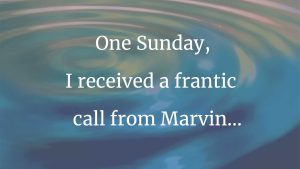
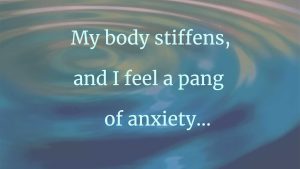
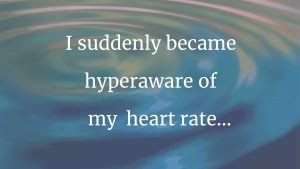
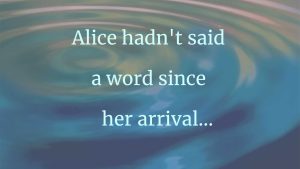
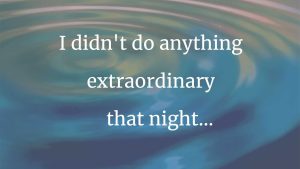
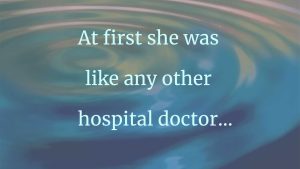
11 thoughts on “Turning the Tables”
What a very honest telling of an encounter that many of us have gone through. As a third year student, many years ago, I remember having to tell a young woman she was positive for HIV, when it was a death sentence. And how many times have our patients helped us through encounters when we think it’s the other way around. After years of practicing Family Medicine, it’s always the relationships that matter. Keep doing good and write about your experiences.
Thank you for sharing your story for your genuine thoughts and feelings .
Your writing validates all of our experiences and helps us to feel authentic, comfortable and confident in a culture of being superheroes and imposters .
Cheers to your learnings and your writing .
I have found a similar value in writing and published my stories in my book A Doctors Dozen.
Be well my colleague!!
Thank you for sharing your story for your genuine thoughts and feelings .
Your writing validates all of our experiences and helps us to feel authentic, comfortable and confident in a culture of being superheroes and imposters .
Cheers to your learnings and your writing .
I have found a similar value in writing and published my stories in my book A Doctors Dozen.
Be well my colleague!!
Beautifully written. Thank you for taking the time out of your demanding day to scribe the story. Love the analogy about the imperfect father. Keep creating.
What a gift you are and will continue to be to your patients – keep feeling, keep noticing the anger and unfairness at metastatic cancer in such a young woman, and keep caring deeply for yourself and you navigate this complex world of medicine (Physician educator for 30 years)
Maybe, as you gain confidence and experience, you will find a way to suggest to a patient like that resilience and courage might be found in letting go of all the trying, fighting. That spouses and children can see bravery in stopping the suffering from pointless treatments. Maybe you will learn from some time with hospice providers that bravery & courage show up in other ways. Maybe she was asking you to guide her to a way out of the medicalization of her process. I don’t know…I wasn’t there… but patients do look to us to help them create different stories for them to live by.
–from 40 years a nurse.
Beautifully said. (Former hospice chaplain and death doula here)
Great writing and a very humane response to a very difficult situation. I’m just another old guy patient, some skin cancer and a pacemaker now at 84, writing poetry every day. Your patients will be lucky people.
This write-up is so heartbreakingly honest & touching. These experiences will shape you in becoming a brilliant doctor, someday. Our shared humanity. . .
I’m retired after 35 years of hospital nursing, including many years on an oncology unit. I helped countless patients interpret their diagnoses, labs, meds, and what their future might look like. I was present at as many, many patients passed over. The best medicine is exactly what you said—being human with each other. Opening your own heart in love to another human being. There is nothing more important than that.
She taught you what it means to be a clinician….a health CARE provider. Well done.